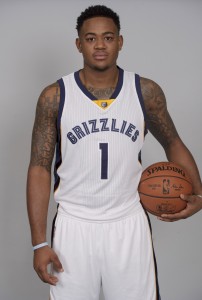NBA rookie contracts for first round picks feature a pair of team options in years three and four, and – unlike standard team options – the deadline for those decisions doesn’t fall on June 30. If a team wants to exercise its 2018/19 option for a player on a rookie contract, that team must do so this month, with an October 31 deadline looming.
Despite being forced to make decisions a year early, most teams simply pick up their club options on rookie-scale players. Even players who have underwhelming rookie seasons deserve an extra year or two to prove their value, and rookie-scale salaries are generally inexpensive, making them a worthwhile investment for NBA teams.
Still, not every former first round pick is worth keeping around for four full seasons on his rookie contract. With the help of our full list of 2018/19 rookie scale team options, here are five players who aren’t locks to have their options for next season exercised this month:
 Jarell Martin, Grizzlies (fourth year, $2,416,222): A report at the start of training camp indicated that the Grizzlies had informed Martin he’d be waived, but had given him the opportunity to stick with the club for the preseason to help boost his stock. He has done just that in the early going, scoring 16 points in 22 minutes in his preseason debut, then nearly recording a double-double (eight points, nine rebounds) in just 13 minutes against the Sixers. Even if the Grizzlies remain prepared to move on from him, it will be interesting to see whether the team finds a taker on the trade market — a new team may be more willing to keep Martin around and perhaps pick up his 2018/19 option.
Jarell Martin, Grizzlies (fourth year, $2,416,222): A report at the start of training camp indicated that the Grizzlies had informed Martin he’d be waived, but had given him the opportunity to stick with the club for the preseason to help boost his stock. He has done just that in the early going, scoring 16 points in 22 minutes in his preseason debut, then nearly recording a double-double (eight points, nine rebounds) in just 13 minutes against the Sixers. Even if the Grizzlies remain prepared to move on from him, it will be interesting to see whether the team finds a taker on the trade market — a new team may be more willing to keep Martin around and perhaps pick up his 2018/19 option.- Cameron Payne, Bulls (fourth year, $3,263,294): It seems unfathomable that the Bulls would decline this option just months after making Payne the centerpiece of a deadline-day deal that saw them give up Doug McDermott, Taj Gibson, and their 2018 second-round pick. However, the early reviews on Payne in Chicago were negative, and he continues to be plagued by foot issues. If the Bulls want to maximize their cap flexibility in 2018, they’ll have to think hard about letting Payne become an unrestricted free agent.
- Kevon Looney, Warriors (fourth year, $2,227,081): The Warriors will likely have the NBA’s highest tax bill this season, and figure to be well over the threshold next year too. That means Looney’s fairly modest $2.23MM salary will be worth exponentially more in tax payments. The former UCLA standout has only played 468 total minutes in his first two NBA seasons, so unless the Warriors plan on having him take on a much larger role in year three, it may make sense to turn down this option — the Dubs can get more bang for their buck by signing a minimum-salary veteran.
- Josh Huestis, Thunder (fourth year, $2,243,326): Even after being stashed in the G League for his first professional season, Huestis hasn’t proven ready to contribute during his first two years with the Thunder — he has played in just seven regular season NBA games. Oklahoma City doesn’t have a deep roster this season after completing a pair of two-for-one trades for Paul George and Carmelo Anthony, so now would be the time for Huestis to step up. If the taxpaying Thunder aren’t confident he can do so, they should re-allocate their 2018/19 money elsewhere.
- Rashad Vaughn, Bucks (fourth year, $2,901,565): The Bucks’ roster is littered with promising young players expected to be part of the long-term core in Milwaukee, but Vaughn has remained on the outside of that group looking in. A former 17th overall pick, Vaughn has struggled mightily during his first two NBA seasons, with a shooting line of just .327/.303/.700 in 111 games. Still, the 6’6″ guard has looked good in the preseason, and is still just 21 years old, which will make the Bucks reluctant to give up on his potential quite yet.
Photo courtesy of USA Today Sports Images.

Looney sucks. He really doesn’t do anything great. He’s poor offensively, not a great rebounder or defender,….
I guess the only good thing about his game is that he moves fairly well… he can run. But you know what, he’s not athletic, doesn’t jump real well . Not enough of a player to keep him around.
I would argue that his biggest setback is his poor movement. He’s had two hip surgeries and it shows. He has no lateral quickness and avoids making lower body contact in the post.
Yep I guess you’re right. He moves up and down the floor as good as any big man but laterally he’s got nothing.
it’s not a hard decision on Payne. cut him